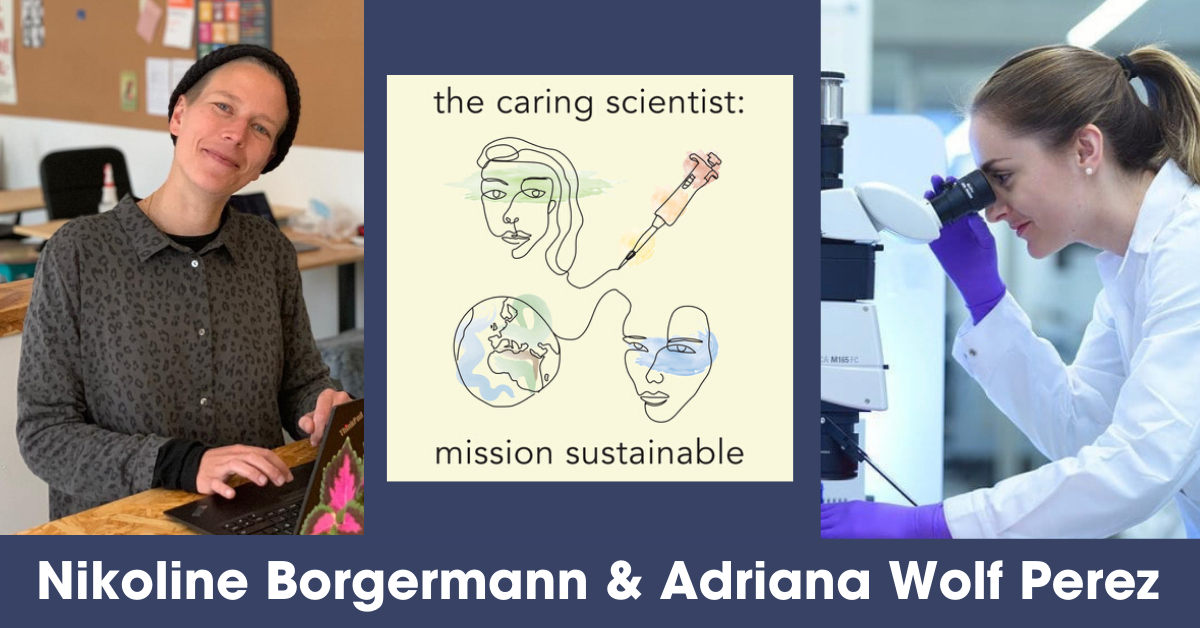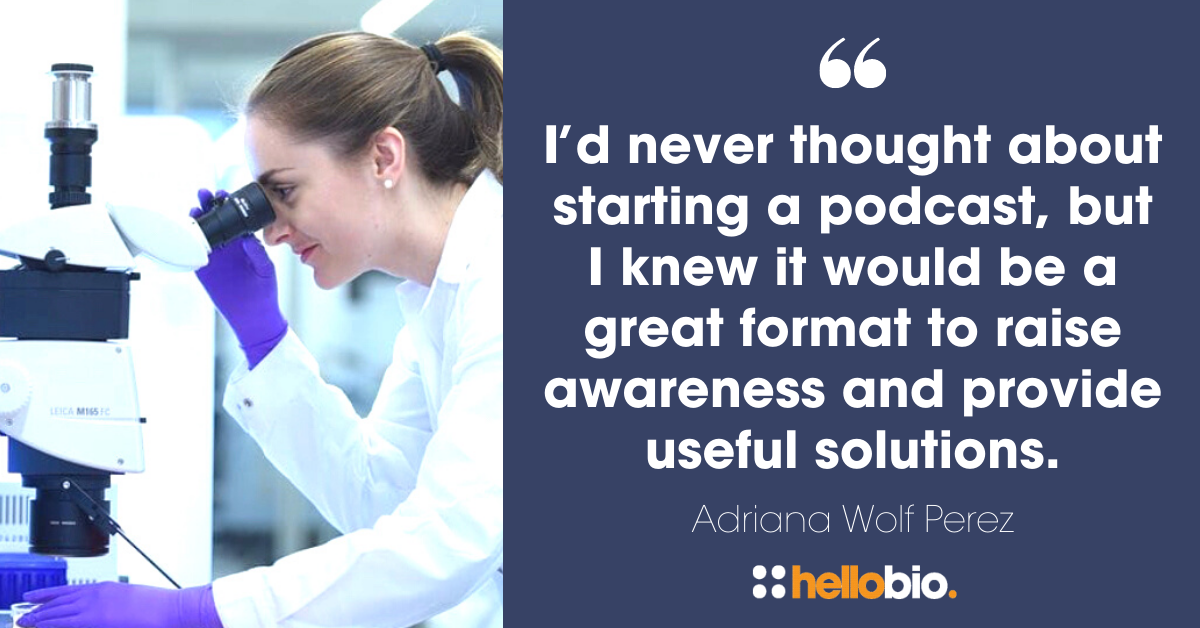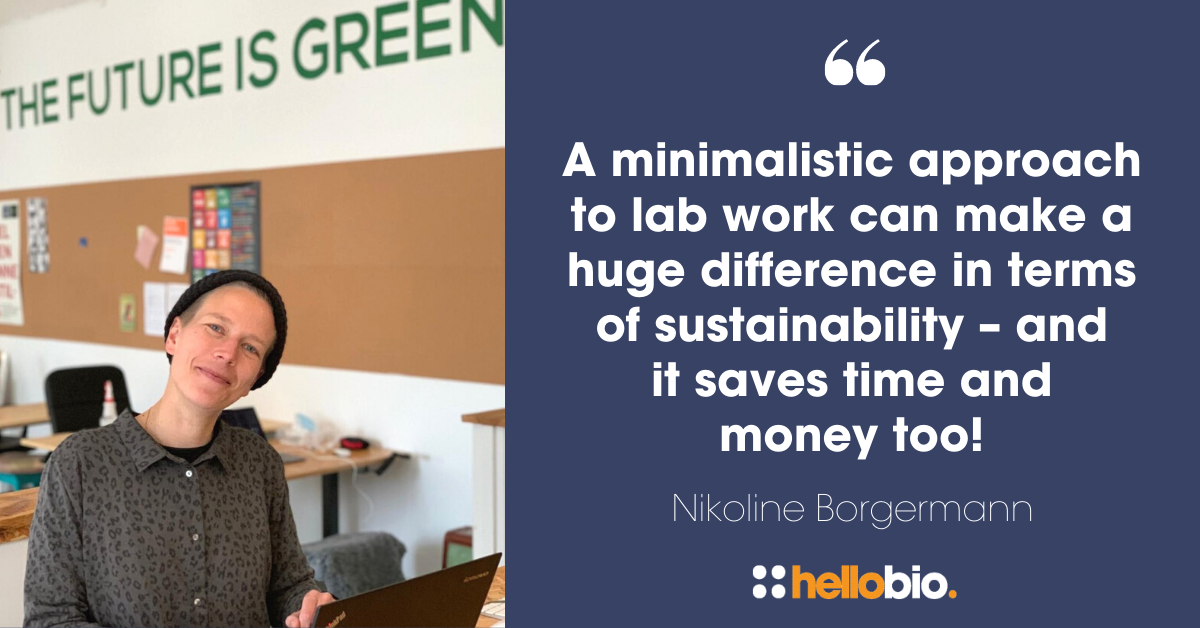Podcasts by Scientists: The Caring Scientist
In the latest in our Podcasts by Scientists series, we shine the spotlight on The Caring Scientist: Mission Sustainable. Created by Nikoline Borgermann and Adriana Wolf Perez, this fantastic audio series aims to create awareness about the environmental impact of laboratory work and to provide hands-on tips on how to reduce it. Every lab user can make a difference!
We chatted to Nikoline and Adriana to find out more about the podcast and how it all came about.
First of all, can you tell us a little bit about your background as scientists?
Nikoline: I have a background in biochemistry from Denmark and Germany, and I did a PhD in genomic (in)stability at the Novo Nordisk Foundation Center for Protein Research at the University of Copenhagen. I always really liked working in a wet lab, and I especially enjoyed working with protein biochemistry. However, I was never really comfortable with the environmental impact of the lab work I was doing, so I decided to quit my postdoc and started working with sustainability in science instead.
Adriana: I’m a biochemist who has studied in Germany, Denmark and the UK, and I hold a PhD in Nanoscience from Aarhus University, University of Cambridge and Novo Nordisk. My research expertise encompasses neuroscience and immunology, although I am also interested in many other research areas such as biodiversity, climate change and circular economy. I’m currently working in a start-up in Cambridge, UK, on the development of therapeutic and diagnostic antibody fragments for neurodegenerative conditions such as Alzheimer's and Parkinson's disease.
Where did the idea for the podcast come from?
Nikoline: I was invited as a guest speaker on another podcast and I really enjoyed it! Conversation is for sure my favorite format of knowledge-sharing. So when I met Adriana (on Zoom) shortly after and saw that we had similar interests and great chemistry, I suggested that we should make a podcast together on sustainability in science - and she said yes!
Adriana: I’d approached Nikoline via e-mail after a friend suggested we might share similar passions about sustainable lab practices. I wanted to compliment Nikoline about her work and hear about her experiences. We had a very nice chat, clicked immediately, and she suggested we start the podcast! I’d never thought about starting a podcast before, but I was immediately excited and knew it would be a great format to raise awareness and provide useful solutions to tackle the problem.
Is this the first podcast you have produced?
Nikoline: Yes! If you listen to the first episodes we produced, I think you will hear that we started with zero experience and learned a lot!
Who is the podcast aimed at?
Adriana: It is mainly aimed at wet lab scientists in academia that are interested to learn more about the environmental footprint of their work and how to reduce it. However, it is also aimed to reach academic group leaders, university staff and lab users at all levels.
You live in different countries - how does this work when hosting a podcast together?
Adriana: Yes, I live in the UK, whereas Nikoline lives in Denmark. It’s quite funny, because we were enrolled in the same master’s degree at the University of Copenhagen and lived in the same dorm for a few months, but never knowingly crossed paths while we were both there! Since both of us have full-time jobs, we mainly work on the podcast on the weekends, which works very well via a video call and we always have a lot of fun.
Have you always been passionate about environmental issues?
Nikoline: I grew up on a small Island in Denmark surrounded by seaside and forest, so I think my passion for environmental issues has been ‘lurking’ since I was a kid. It grew dramatically as it became increasingly evident to me that our planet really isn’t in a good state and that we have to treat it differently!
Adriana: For me, as a child, my parents always taught me how important it was to respect nature and to consume resources in a mindful way. In the last few years, I’ve been actively involved in environmental volunteering activities. For example, I was part of Aktion Amager, an initiative in Copenhagen to clean the shore and sea of plastic waste. Currently, I am a Volunteer Climate Officer at the Collective for Climate Action, a self-organised network of public sector employees working throughout the UK to build ambition in government on addressing the climate and biodiversity crisis.
Which sustainability solutions do you think could have the most impact if implemented by more scientists and labs?
Nikoline: Minimalism! Use as little reagent as possible, use the smallest possible item (for example cell dishes and sample tubes), don’t store samples or data that you won’t need again, don’t keep equipment on when it isn’t needed. A minimalistic approach to lab work can make a huge difference in terms of sustainability – and it saves time and money too!
Adriana: Reducing the use of single-use plastics, chemicals and other resources and where possible trying to reuse them or replace them with more sustainable alternatives. Also, reducing electricity usage in labs and optimizing cold storage can have a big impact in terms of reducing CO2 emissions.
Which topics or themes do you have coming up in future episodes?
Adriana: We have a lot of exciting episodes coming up and some of them will include interviews with several experts and organisations. The next episodes will be about sustainable conferencing, green lab certifications schemes, green chemistry and bioplastics.
What are your plans for the podcast long-term?
Nikoline: So far, the plan is to make another season after the summer holidays – and then we will take it from there! We will keep making the podcast as long as 1) it adds value to people’s lives 2) it makes a green difference, and 3) we think it’s fun to do!
Adriana: Absolutely! We hope to continue releasing two episodes per month, address the latest sustainable lab topics and provide useful hands-on tips. We have had people reaching out to collaborate, which is very exciting, and we are always open for suggestions and more collaboration. Ideally, we would like to grow - to reach and inspire more scientists around the world to take action and spread our 'Mission Sustainable'.
What advice would you give to other scientists who are keen to get into podcasting?
Nikoline: Just start! We struggled with our perfectionism in the beginning but quickly realized that we would never release any episodes if we let perfectionism dictate our work. Progress is more important than perfection - and you will learn quickly!
Adriana: Our audio quality certainly wasn’t the best in our first episodes! We know we are not professional podcasters, however, Nikoline and I are quick learners and are very passionate about our podcast. I recommend looking on Youtube for helpful resources when starting a podcast!
Aside from The Caring Scientist: Mission Sustainable, which other science-themed podcasts would you recommend?
Adriana: I really enjoy “How to Save a Planet”, which is a well-researched podcast about climate change and the presenters are very charismatic. I also enjoy listening to “The Naked Scientists” for updates on the latest scientific discoveries.
How can our readers listen to your podcast?
Our podcast can be found on Anchor, Breaker, Google Podcasts, Pocket Casts, RadioPublic, and Spotify. It’s called: “The Caring Scientist: Mission Sustainable” and we’re always open for suggestions and feedback -- feel free to reach out!
___________________________________________
Connect with The Caring Scientist podcast:
- Email: podcast@avasustain.com
- Twitter: @caringscientist
- Instagram: @thecaringscientist
___________________________________________
If you enjoyed this article, why not check out the other resources available on our blog. We are passionate about supporting life scientists, early career life scientists and PhD students - with really low- priced reagents and biochemicals, early career scientist grants, and resources to help with both personal and professional development. We know how tough it is - so we hope you find these helpful!
Advice & guidance for life scientists
Click below to view our essential guides and articles to support life scientists, PhD students & early career life scientists:
Wellbeing for scientists
Click below for our resources to help improve your wellbeing:
Technical resources
Try our Molarity Calculator: a quick and easy way to calculate the mass, volume or concentration required for making a solution.
Try our Dilution Calculator: an easy way to work out how to dilute stock solutions of known concentrations
And - when you get to the stage of planning your experiments, don't forget that we offer a range of agonists, antagonists, inhibitors, activators, antibodies and fluorescent tools at up to half the price of other suppliers - click below to see how we compare with other suppliers:






















